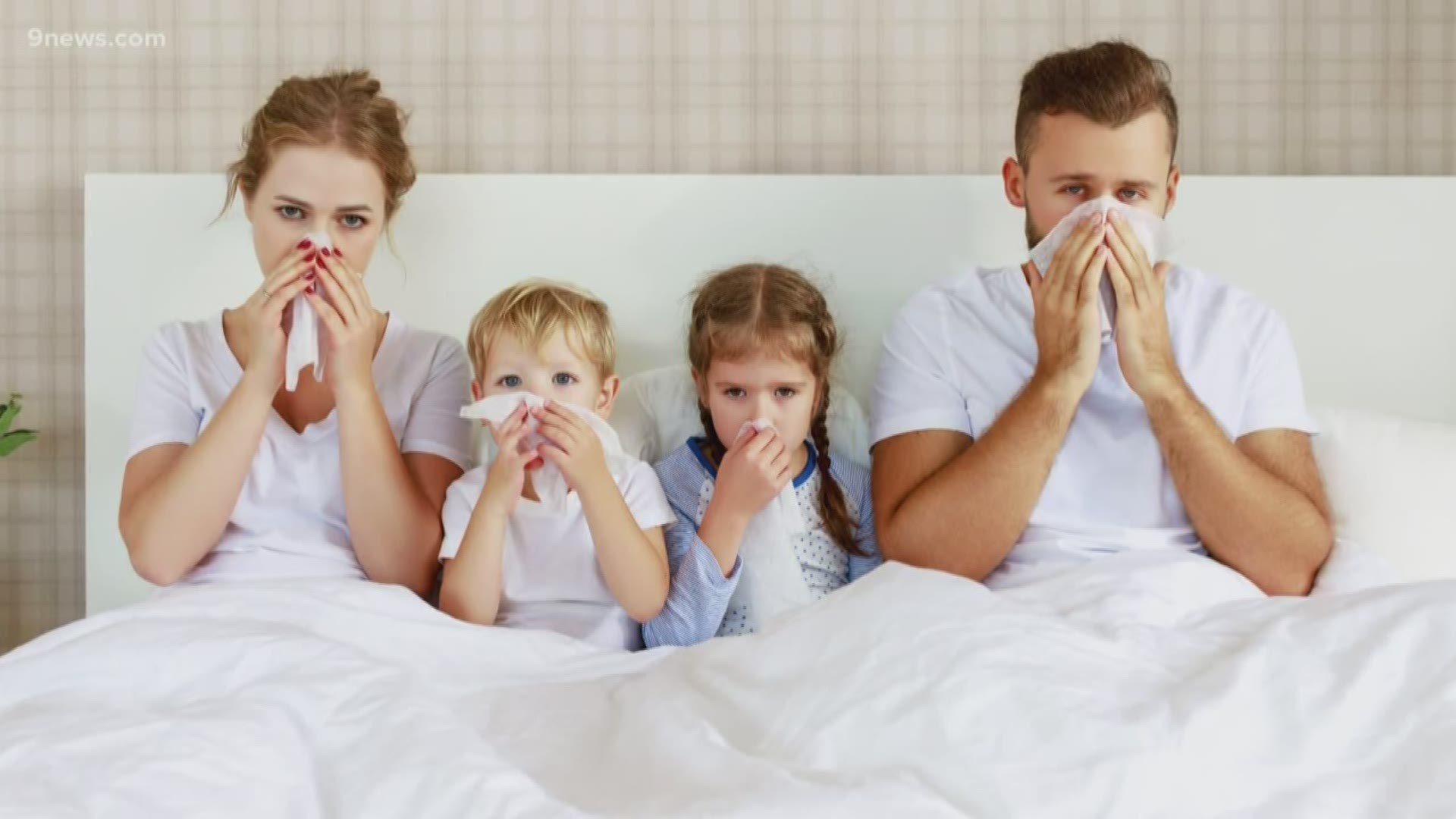DENVER — At some point in your life, you may have heard someone say, 'You better put a coat on, or you’ll catch a cold.' Maybe you've even said that yourself, but is it true?
"So they are right, but probably for the wrong reason," said Dr. David Beuther, a pulmonologist with National Jewish Health. "It has less to do with your body getting cold, and more to do with the many other reasons that the cold and flu viruses tend to be more of a problem in the winter months."
There is a connection between the weather and how illnesses spread. Dr. Beuther answered a few questions asked by 9NEWS on Thursday.
(Editor's note: Answers have been edited for context and clarification)
9NEWS: What is the relationship between cold weather and illness?
Beuther: It turns out that the cold air actually allows the virus to survive longer. And those particles that blast out when you sneeze kind of dry up and get smaller in the cold, so they can disperse much farther. So the virus lives longer, it disperses better, it’s transmitted better when it’s cold outside.
What is the main reason cold and flu season is in the winter?
Beuther: People spend more time indoors when the weather is cold. Often times we’re very closed up, air is recirculated, there’s a lack of fresh air, and so if there are particles that are containing a virus, they tend to spread easier inside because of that lack of circulation.
People say that if you're out in the cold, your body uses it's energy trying to stay warm, and that weakens your immune system. Is that true?
Beuther: There probably isn't a whole lot of truth to that, but cold weather tends to be very dry, and that can have more of an effect.
How does dry weather make viruses worse?
Beuther: The nasal mucus membranes kind of have their own physical defense. The tissue has to be moist and well hydrated with a nice little mucus layer to capture the virus and kick it out of there. And when that membrane gets dried out, there are essentially cracks in the wall, and the virus can sneak through there.
Can fatigue lower your immune system?
Beuther: We do know that some athletes that over train can suppress their immune system. We often see when they are training for that marathon or triathlon, they end up getting that cold virus right at the worst time right before their competition.
How does sunshine effect viruses?
Beuther: The sunshine provides us with a source of Vitamin D. A lack of sunshine could slightly impair our immunity. I wouldn't suggest that if you stay indoors, you're going to have a lousy immune system, but the sunshine does improve our situation.
Does a warm winter equal a bad cold and flu season?
Beuther: I'm not aware of any data showing that connection, but it is really interesting that some of our big viral pandemics like the influenza pandemics that occurred in the 1900s, oftentimes were accelerated or kicked off by an episode of lower humidity. So you see the humidity suddenly drop, and then the influenza kick up right afterwards.
Colorado has notoriously dry air. Are our cold and flu seasons worse because of that?
Beuther: It's hard to say. You could even make a case that we have an environment that better protects us from illness. We get a lot of sunny days like this week when everyone goes outside and gets that sunshine and fresh air. They open the windows and ventilate their sealed houses. I think you would find that its a little bit of a mixed bag of good and bad.
Do the viruses disappear or die in the summer?
Beuther: We see a huge reduction in cases, but what these viruses tend to do is they then become more prevalent in the southern hemisphere. As we are coming out of our cold and flu season, a place like Australia is starting to go back into it.
Can we learn anything by watching the other side of the planet?
Beuther: We are always keeping a close eye on the southern hemisphere during our summer, because what ever they are dealing with at the end of their winter is usually what is coming our way next.
Will the weather reduce the occurrences of the new coronavirus?
Beather: We just don't know, because it is new. It may behave differently, but there is speculation that the novel Corona virus is similar to other Corona viruses and cold viruses, that with the weather change that maybe we will see a lull in the virus in the summer.
RELATED: Coronavirus live updates: Pence pledges 'full support' to Washington state in coronavirus fight
RELATED: VERIFY: Hand sanitizer can protect against coronavirus, but not as well as washing your hands
SUGGESTED VIDEOS: Science is Cool

